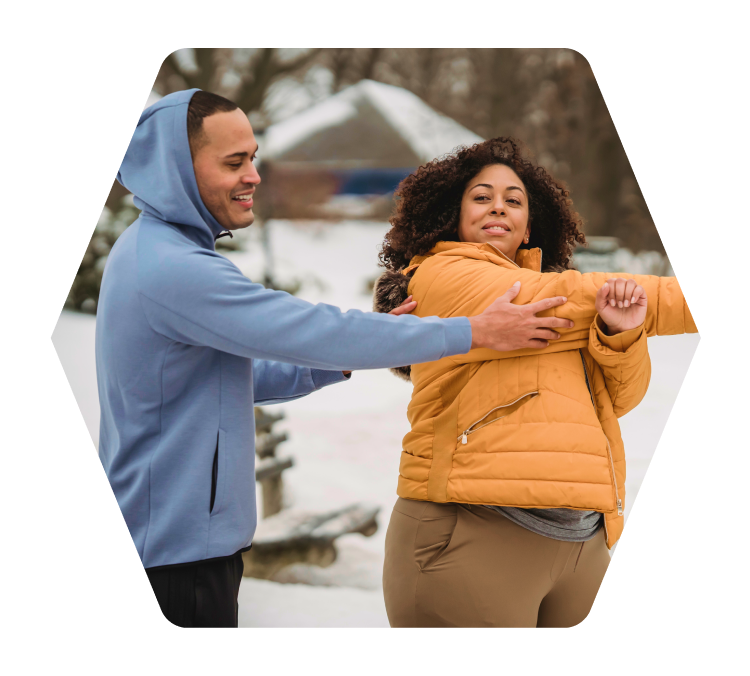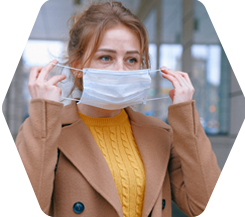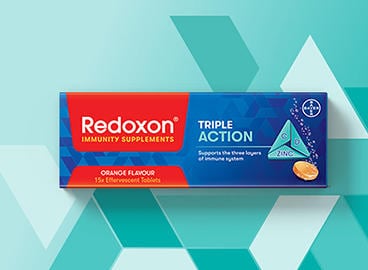If you want to keep your immune system healthy and robust, it is a great idea to exercise regularly. Along with other important factors like eating a balanced diet, getting adequate sleep, maintaining a healthy weight, and minimizing stress, regular physical activity strongly affects your immunity and helps you avoid infections1.
Immunity-boosting balance
First of all, you should remember that exercising can affect your immunity in both ways2-4. This means that if you engage in regular, but moderate physical activity, your risk of infection is lower than in a person leading a sedentary lifestyle. On the other hand, if you do a lot of physically demanding endurance exercises, your immune responses can be suppressed, putting you more at risk of infection. So, if your goal is to boost your immune system, moderate and regular exercise is your best choice.
Redoxon® Triple Action
with vitamin C, D and Zinc

Choose an activity you enjoy!
If you want to get active, it’s best to choose a type of activity that suits your lifestyle. If you’re already living an active lifestyle and exercise is part of your daily routine, keep at it: an even more intensive exercise regime won’t help improve your immunity even further5. But if you aren’t particularly active, start by finding time for exercise several times a week.
bullets
- Walking: You can start going for a walk every day for 20 to 30 minutes. Walking is easy to incorporate into your day: you can walk to work instead of taking a bus, take your dog on little adventures to the nearest park and back, or meet a friend every day for a chat and a walk.
- Cycling: Increasingly popular with all age groups, cycling is a great way to get your workout in and get where you need to go every day. If you live in a big city with frequent traffic jams, taking a bike ride instead of driving can quickly become a pleasant, relaxing beginning and end to your working day. Taking family bike trips is also a great way to bond, have fun, and exercise together.
- Strength training: When we talk about weights, we normally think about the gym. If going to the gym isn’t your first choice, you can do simple strength exercises like push-ups at home, or even do strength training with household items: large water bottles make great weights, and you can do some exercises like arm curls in your kitchen chair.
- Aerobics: The best thing about aerobic exercises is that you can find hundreds of online videos on great exercise routines prepared by professionals. You can even start doing aerobic exercises with your family or friends and cheer each other on!
- Swimming: whether at the beach or the swimming pool, swimming is a great activity you can do all year. It helps improve your stamina and general fitness, and does wonders for relaxation, too!
- Football (and other team sports): Team sports are not only a great way to exercise, but also to form and maintain friendships. You can usually find local amateur teams playing football at the nearest field, or you can start a team of your own with friends!
- Playing with kids: Your kids have boundless energy and they love spending time with you, so why not treat playtime as an opportunity to get your exercise? You can play catch or hide and seek in your backyard, teach your kids to play ball or simply go for a family run!
Whichever type of physical activity you choose, exercising makes you feel more energized and can improve your overall sense of wellbeing. So start including exercise in your daily routine today, develop a good habit and enjoy feeling healthier!

References:
- How to prevent infections. Harvard Medical School, 2016. (Accessed 10/02/2020, at https://www.health.harvard.edu/staying-healthy/how-to-prevent-infections.)
- Cox AJ, Gleeson M, Pyne DB, Callister R, Hopkins WG, Fricker PA. Clinical and laboratory evaluation of upper respiratory symptoms in elite athletes. Clin J Sport Med 2008; 18:438-445.
- Cox AJ, Pyne DB, Saunders PU, Callister R, Gleeson M. Cytokine responses to treadmill running in healthy and illness-prone athletes. Med Sci Sport Exerc 2007; 39:1918-1926
- Gleeson M, McDonald W, Pyne D, Cripps A, Francis JL, Fricker P et al. Salivary IgA levels and infection risk in elite swimmers. Med Sci Sports Exerc 1999; 31:67-73
- Exercise and immunity https://medlineplus.gov/ency/article/007165.htm











